#NarrativeJustice
Sept. 25-29, 2023 Yerevan, Armenia




Cover image by Dana Walrath, based on images from a Soviet-era Atlas and book about illuminated manuscripts from the Matenadaran. It speaks to the fetishization of land and women’s bodies.
Table of Contents
Welcome
The Context for the Workshop
An Introduction to Armenia
The Theme and Goals of the Workshop
The Program
Day 1 | Sunday, Sept. 24
Day 2 | Monday, Sept. 25 | Power, Hidden Things and Trapped
Solutions
Day 3 | Tuesday, Sept. 26 | Time, Identity, Land and Homeland
Day 3 | Wednesday, Sept. 27 | Exchanges: Unweaving Imposed
Identities
Day 4 | Thursday, Sept. 28 | Reclamations and Re-membering
Day 5 | Friday, Sept. 29 | Reframing and Re-imagining: (K)new
Horizons
The Logistics
Covid / Healthcare
Flights
Accommodation
Photography and Videography
Outputs
Self-care
Main Points of Contact During Your Stay
Emergencies and Insurance
Emergency Services
Travelers' Tips
Customs and Cultural Protocol
Getting around Yerevan
Pre-reading List
The Armenian Language
Participants’ Biographies
Welcome
We are delighted that we will be coming together as Fellows and staff to this inperson skills workshop focused on narratives. This workshop is based on the report, Re-membering Through Narratives, researched and written by Global Atlantic Fellows Durkhanai Ayubi and Dana Walrath. Huge thanks to both of them for all the thought and organization they have put into this workshop. We are particularly excited about exploring this theme in Armenia, Dana’s ancestral home!
Back in November 2019, Dana and Durkhanai were paired as participants for a workshop, hosted by the Atlantic Institute, on leadership narrative and social change at Rhodes House, Oxford. That experience drew on the participants’ lived experiences and knowledge to develop narrative skills. Dana and Durkhanai have co-designed this workshop in Armenia as a place-based, Fellow-centered learning experience that will reveal how narratives contribute to equity or inequity globally. We will be primarily based in the capital city, Yerevan, but will visit other parts of Armenia as well.
In the course of the workshop, you will be connecting with Global Atlantic Fellows, some of whom may speak different languages to yours and see the world through a different lens. Fellows and staff will bring their own experiences of narrative work to the fore — speaking from different contexts, cultural settings and knowledge systems. This is what makes our community so special as we connect across diversity and work together to explore shared root causes with a vision to reimagine and create solutions for a better world.
Over the week, we will be hosted by people in Armenia who have taken the time to share some of their lives and work with us. They will invite us into their homes and organizations, and centers of learning and community-building. This is a wonderful opportunity to suspend our own sense of knowing and doing and open ourselves to new ways of thinking and experiences. Get ready for some intense, emotional days as we learn about Armenia and her people. Engage in debate and discussion, and take in the sights and sounds of this beautiful country. We hope you will find this visit fruitful as we aim to support your storytelling, which has the potential to be an extremely powerful tool in shaping public opinion and influencing policy.
With warm regards,
The Atlantic Institute team
Our Commitment to Each Other
The global community of Atlantic Fellows and staff is a purposeful, values-driven endeavor, which is about making an impact for the benefit of others. It is also a gift exchange, with benefits as well as obligations. As part of these obligations, we ask that members of this community (all of us) give expression to our values in the following ways:
● Show up with kindness and integrity as you connect with people who bring different perspectives and experiences. We ask that you:
○ Share your own perspectives with authenticity, grace and care.
○ Sometimes step back and listen to others to ensure there is space for perspectives/narratives/ stories other than your own.
○ Engage in courageous conversations (including disagreement) with kindness and empathy deconstruct but also focus on rebuilding and (k)new solutions.
○ Recognize your own privilege and power, and take action to challenge the status quo and lived realities.
○ Feel free to reimagine a (k)new world with others in this community.
○ Be mindful of others’ privacy, both in terms of what you share following an experience and on social media if you are photographing others.
● Be leaderly and respectful in the way that you honor the gift of the Atlantic community and, in particular:
○ Show up on time for flights, transfers, and programming. Be present and respectful of each other and the convenors.
○ Be generous with your time and, where possible, your resources in the spirit of reciprocity.
○ Be kind and gracious in the receipt of resources. It is a community of love, but the staff are not your personal travel agents or assistants!
○ Share the results of your experiences as an Atlantic Fellow inside and outside of this community.
Respectful and courteous behavior towards our dedicated staff is a fundamental aspect of our Institute’s ethos. Fellows are kindly reminded that any form of abuse or mistreatment towards staff members may result in a request to leave the workshop.
The Context for the Workshop
Our belief in the power of story to generate fairer, healthier, and more inclusive societies lies at the heart of this “Re-membering Through Narrative” workshop. The workshop developed from a report that we (Durkhanai and Dana) had the pleasure of co-writing during 2020 as Atlantic Fellows living in distant hemispheres, hailing from distinct programs Melbourne-based Atlantic Fellows for Social Equity and Atlantic Fellows for Equity in Brain Health, which straddles Dublin and San Francisco yet, we deeply connected through shared ancestral homelands along the Silk Road. Parallel foods, bits of language, mountains, traditions of hospitality along with forced displacement and massacre from waves of imperialist conquest unite us both. All this, combined the layers of privilege we know first-hand from our respective countries of citizenship, Australia and the United States places built on domination, extraction, exploitation and profit — shape the two-fold approach we take to narrative.
First, because we see the current world order as rooted in a series of monolithic dominant narratives that naturalize systems of injustice, we begin by excavating these narratives in order to strip them of their power. This excavation, in turn, makes space for the multiplicity of narratives required to underpin the move collectively back to health, peace and balance. Such multiplicity honors diverse ways of being and knowing that have been preserved in various forms in cultures throughout the globe and unite us in what we all know in our hearts instinctively and intuitively.
As storytellers, we offer a series of tools both to decode the ways that narrative works locally and globally to shape systems, beliefs and practices, along with specific techniques for harnessing the power of narrative. Using Armenia and nearby Afghanistan we are separated only by Iran as places through which to explore the mechanics of narrative, we will make space for each participant to share the role of narrative in their own work. In the spirit of reciprocity, we will collectively engage with the complexity and power of narrative in a world dominated by data. Together, the workshop will make visible a place-based approach to narrative that can be transferred to different geographical and situational contexts, each with their own dominant narratives in order to harness storytelling as a tool of liberation.
An Introduction to Armenia
An independent country only since 1991, Armenian culture has existed for at least 6,000 years. Its traditional homelands, located in southwestern Asia and spanning either side of Mount Ararat, Armenia’s borders and boundaries have waxed and waned and shifted as religious ideologies and imperialist powers have swept through these lands. A mountainous crossroads between the eastern and western sides of Eurasia and the overland connection between Africa and Eurasia, ancient Armenia touched the Mediterranean, Black and Caspian Seas.
In today’s world of hard boundaries, reflecting the forgotten fluidity of ancient boundaries, both our home countries today known as Afghanistan and Armenia were part of the same Persian and Hellenistic Empires, spanning a greater than 2,500 year history that predates even the Empires.
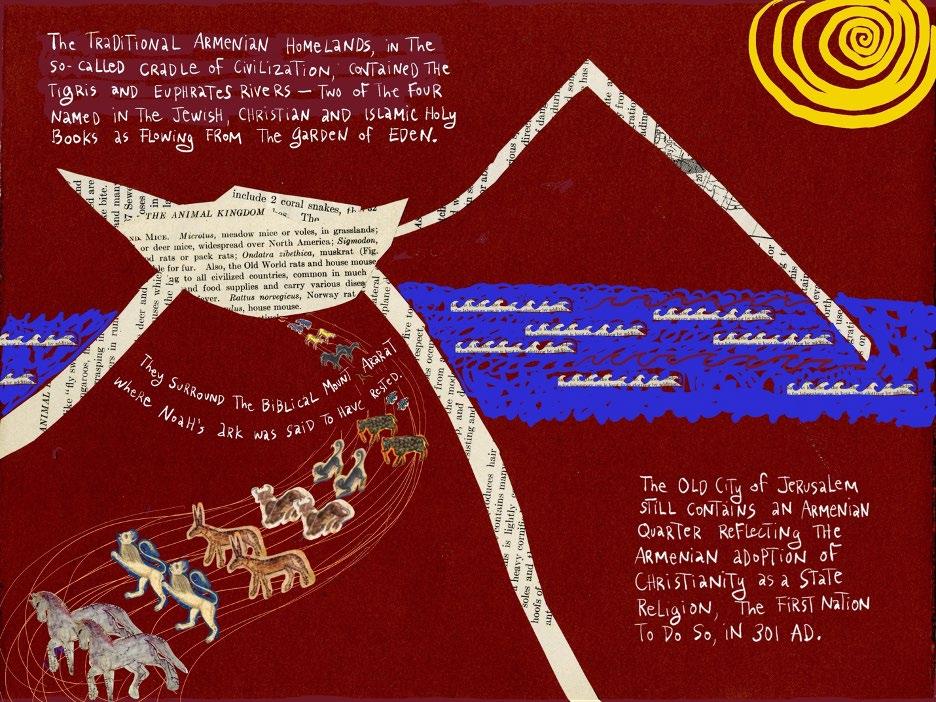 Above: The artwork by Dana Walrath conveys Armenia’s historical context.
Above: The artwork by Dana Walrath conveys Armenia’s historical context.
The connectivity that transcends today’s boundaries, continues to be reflected in belonging to branches of the same Indo-European language family, as well as in the flavors, recipes and rituals associated with shared histories of hospitality.
Armenia was the first state to adopt Christianity as a state religion in 301 AD, entrenching patriarchy within Armenian culture from that point forward. One hundred years later, a monk invented the Armenian alphabet (դարպեր լեզո մեն ե…) setting a tradition of illuminated manuscripts in motion. As a crossroads, multiple peoples and religions came to coexist, their interactions shaped by the systems and structures of the ruling elites.
The majority of the Armenian homelands were under the rule of the Ottomans for 500 plus years until this empire collapsed in the early 20th century. The remainder was under Persian and Russian control. The Ottomans had swept in from Central Asia and came to dominate North Africa, Southwest Asia and Southeast Europe, including the final stretches of the Silk Road and all of its ports. For centuries, the Ottoman Empire had systematically persecuted its ethnic and religious minorities.
For better and for worse, Amrneians have long sought safety in proximity to whiteness. During the 19th century, when missionaries from Europe and the United States arrived to bring “civilization” to the “backwards' ' people of the Holy Lands, Ottoman law banned proselytizing to Muslims. This left Armenians to take full advantage of the education offered by the missionaries potentiating the possibility of changing the discriminatory laws built into the fabric of Ottoman society. In the final stages of collapse, the Ottoman government set out to eliminate its remaining minority groups, Armenians, Assyrians, Greeks and Yezidis, blaming them for the collapse. Three out of every four Armenians (1.5 million people) in what is now Eastern Turkey were killed. From Syria to Serbia, to Libya to Bosnia, to Yemen to Sudan to Iraq — to this day, violence plagues the countries birthed by the Ottoman collapse. In the wake of the genocide and World War I, white Euro-American financial and political interests took precedent over supporting the formation of an independent Armenia.
The strategic importance of Turkey for NATO has allowed Turkish denial of this genocide to stand, leading to ongoing systemic and overt violence. Within the Soviet Union, boundaries were drawn between Armenia and Azerbaijan to pit ethnic Turks and Armenians against one another in order to maintain central Soviet control. In the 1950s, Armenians were purged and cultural heritage erased from a part of Azerbaijan that lay to the west of Armenia without any shared border with the rest of its country. The main part of Azerbaijan also contained a distinct Armenian enclave called Artsakh by Armenians while others use its Russian name Nagorno Karabakh (Mountainous Karabakh), a site of deadly Pan-Turkism today.
With the dissolution of the Soviet Union complete in 1991, Armenia became an independent state as did Artsakh, though Artsakh remains unrecognized by any major global powers on account of their oil interests in Azerbaijan. Violent conflict immediately followed in the form of 1991-1994 war between Armenia and Azerbaijan and civilian-led pogroms enacted by both sides. In the fall of 2020, under the cover of COVID-19, fully-fledged violence returned when Azerbaijan, with military support from Turkey, attacked Artsakh, starting a war that lasted 44 days. Artsakh lost three quarters of the territory it had gained in 1994. On Dec.12, 2022, the Azeri military closed the Lachin corridor, Artsakh’s only contact point with the rest of the world via Armenia. This small independent state is otherwise fully surrounded by Azerbaijan This illegal total blockade, first timed for the dead of winter, has prevented the flow of food, medicine, fuel and international aid into Artsakh, endangering the lives of its entire population. A clear crime against humanity and human rights violation, the blockade, now past its 200th day, has received international condemnation but no concerted action to end it. Euro-American powers kowtow to both Azerbaijan and Turkey, putting oil and military strategy above the protection of human rights.
Today, Armenia is a tiny landlocked country in the portions of its ancestral homelands located within the former Russian Empire and Soviet Union, with few open borders. It is surrounded by the oil-rich states and Turkey, the Ottoman Empire’s successor state. A middle-income country with a current population of around 3 million, Armenia lies firmly in the middle of the UNDP Human Development Index. Another 7.5 million Armenian diasporans live around the globe. The majority of these were forcibly displaced by genocide augmented by a local “brain drain” and high unemployment until recent times. Ottoman colonization, genocide, and the EuroAmerican and Russian imperialism that followed provide a different lens for discussion of settler colonialism, systemic racism and ongoing violence. Armenia allows for an exploration of narratives in terms of a process that creates pathways of solidarity.
Over the past few years Armenia’s capital, Yerevan, has become a boom town with the influx of wealthy liberal Russians fleeing Putin’s regime, Syrian Armenians forcibly displaced by violence and a vibrant tourism industry drawing people primarily from across Eurasia and the Americas. An infusion of cash and innovations, and various forms of aid from the diaspora, augments this boom along with a vibrant repatriation movement.
Armenia provides a living laboratory for conversations about power, borders, identity and genocide. Its history parallels that of white settler colonialism but with different perpetrators making space for us to explore deep time, along with the myths and processes of oppression. Its survival as a country remains under threat because of festering hatreds and denied histories, which are ultimately shaped by politics, money and the military industrial complex. Narrative takes us immediately to these deepest roots and a search for solutions that move beyond naturalized, monocultural norms. Above all, Armenia is a place of natural beauty, ancient cultural traditions and hospitality that will support us as we excavate the narratives and unjust systems that constitute our current world order.
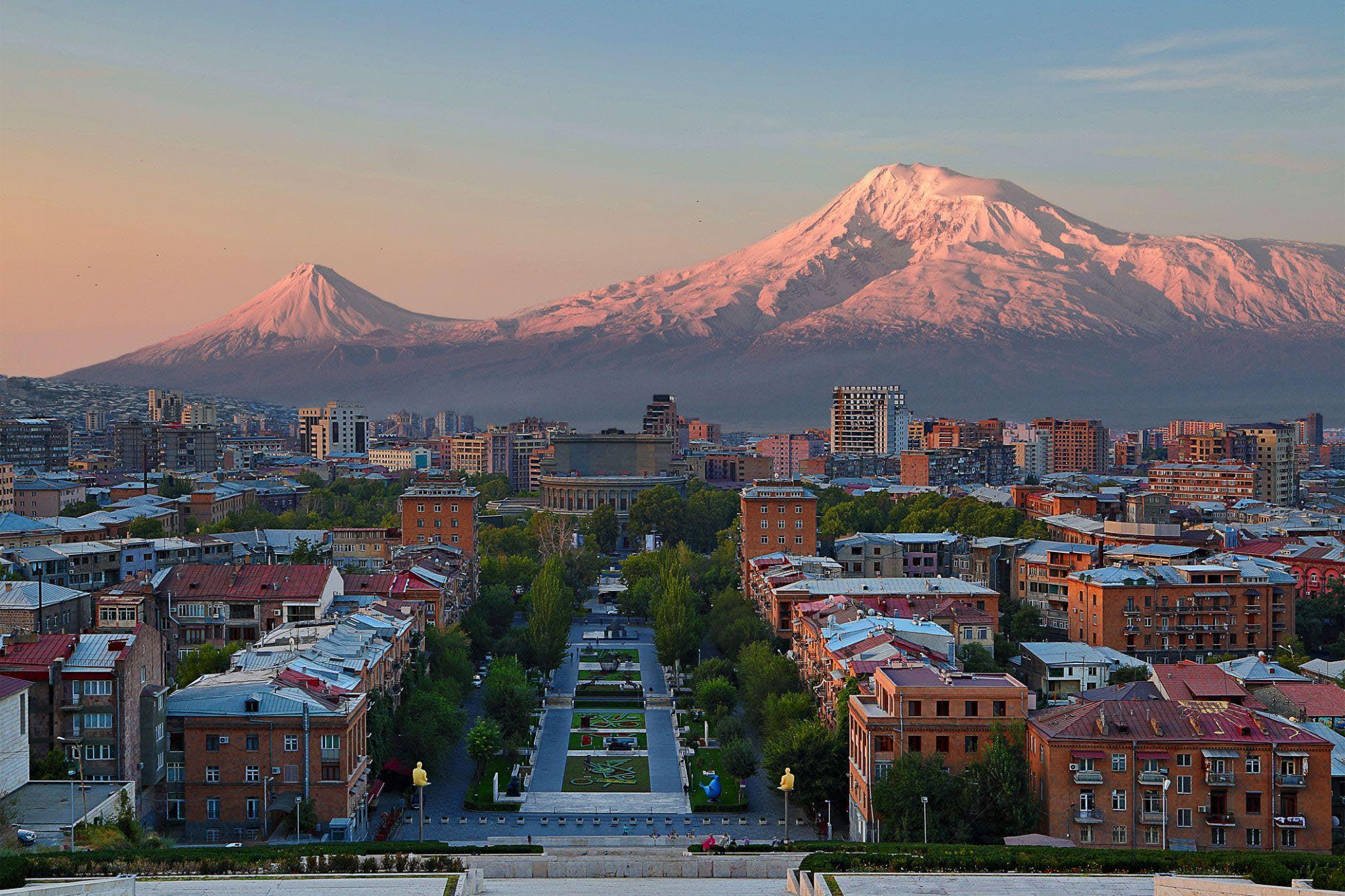 ABOVE: View over the city of Yerevan, Armenia, with Mount Ararat in the background.
ABOVE: View over the city of Yerevan, Armenia, with Mount Ararat in the background.
The Theme and Goals of the Workshop
During this workshop, we position narrative as the foundational space from which our realities, personal and collective, arise. We will share the ways in which we can utilize narratives. Narrative can be a tool to decode existing unseen barriers to our work and can also be a way of harnessing what we create from the shifted and more expansive possibilities.
The workshop will use this narrative lens to closely scrutinize, and challenge, a notion of power that is normalized as authoritarian, exclusionary and hierarchical. We offer instead a scaffolding based on elevating the buried notions of interconnection that shape us and re-weave into form the multiplicities that make us.
During the five days of the workshop, we will move through the following five themes:
● Power, Trapped Solutions & Hidden Things
● Time, Identity, Land and Homeland
● Exchanges: Unweaving imposed identities
● Reclamations and Re-membering
● Re-Framing and Re-Imagining:(K)new Horizons
We chose these themes because we believe that dominant narratives, grounded in a monocultural worldview, contribute to the unjust world order we inhabit today, and, we posit, inhibit and distort even our efforts toward justice.
The goals of the workshop include:
● Honing skills to excavate and expose false dominant narrative.
● Refining processual approaches that link across time and space and that value multiple forms of storytelling.
● Creating (k)new approaches to injustice liberated from the constraints of dominant narratives that harness our inherent multiplicity of story.
● Building reciprocal linkages amongst participants that will extend beyond the workshop.
● Experiencing a place-based approach to narrative work that can be transferred to multiple geographies and contexts.
The Program
Although we will be largely based at Villa Ayghedzor in Yerevan, we have included an overnight trip to the Goris area to see Family Care Foundation’s most recent ceramics initiative. Please bring a simple overnight bag to travel light for this stay. You will be able to leave everything else undisturbed in your room in Yerevan.
Please also bring along an object connected to whatever home and homeland mean to you that can be woven into the collaborative artwork that we will create at Villa Ayghedzor over the course of the week.
Some of the places we will visit:
Cafesjian Center for the Arts (Optional)
Sourp Dzoravor Church
Parajanoff Museum
Arenia Cave
Goris
Hartashen
Orbelian Caravanserai
Geghard
Yerevan’s Women’s Center
Tsisternakabert Genocide Museum
Garni (See photo below: A view of the valley from the village of Garni)

The Program
Day 0 | Sunday, Sept. 24
19:00 onwards
Welcome Dinner
Catered at Villa Ayghedzor
Day 1 | Monday, Sept. 25 | Power, Hidden Things and Trapped Solutions
We have slotted each participants’ presentation into a specific place per our meetings earlier this month. Please reach out to Dana and/or Durkhanai if you have any concerns about where and when you have landed.
05:00-07:30
Sunrise Ceremony OPTIONAL Cascade Steps, Yerevan
07:30-09:00 Breakfast Villa Ayghedzor
09:00-11:30
Re-membering Through Narratives: Framing Session
11:45-12:45 Walk to Sourp Dzoravor look and light candles
12:45-1:15 Walk to Kond
Villa Ayghedzor, Library
Sourp Dzoravor
13:15-14:15 Lunch at Kond Anahit and Sarkis
Droshakiryan’s home
14:15-14:30
14:30-18:00
Walk to Parajanov Museum
● See Museum
● Fellows’ presentations (Laura, Brenda Nasser, Katrina)
● Reception
● Sunset reflections
Parajanov Museum
19:00 onwards
Free evening
Dinner options on own or light fare provided at Villa
EARLY START ON DAY 2!
Day 2 |
Sept. 26 | Time, Identity, Land and Homeland
07:00-08:00
08:00-10:00
Breakfast
Drive to Areni-1 Cave Complex
Villa Ayghedzor
10:00-11:00
Areni-1 Cave
● Framing and discussion
● Snack and crafts
Areni-1 Cave
11:00-13:00
13:00-14:00
Drive to Goris/Hartashen
Arrive at Hartashen and Lunch with Satenik’s family
Hartashen
14:00-17:00
Ceramics School meet students and teacher
Fellows present in the proposed New Arts Center (Collins, Rowena, Thania, Gilberto, Ruby)
17:00-18:00
Drive back to Hotel
Khoreayi Dzor in Gorisstop by river and mountain formations for sunset reflections
Khundzoresque
19:00-22:00
Dinner with some local leaders (Option to dine in one’s room)
Hotel Khoreayi Dzor
Tuesday,
Day 3 | Wednesday, Sept. 27 | Exchanges: Unweaving
Imposed Identities
07:00-08:30
Breakfast + checkout
Hotel Khoreayi Dzor
08:30-11:00
11:00-12:30
Optional visit to local bakery to see them make traditional flatbread
Drive to Orbelian Caravanserai Vayots Dzor
Explore and framing discussion
Picnic Lunch
12:30-15:00
15:00-16:00
Drive to Gerhard (via Lake Sevan)
Gerhard Monastery
● Each to share something sacred in the amazing acoustic room
Mets Gilanlar, Armenia
16:00-16:15
16:15-18:15
Drivel to Garni
● Arrive at Garni See Pagan Temple and Dzor, time to shop
19:00-20:30
20:30-21:30
Dinner at Garni
Breadhouse or 7 Qar
Drive back to Yerevan Villa Ayghedzor
Day 4 | Thursday, Sept. 28 | Re-clamations and Remembering
08:00-10:00
10:15-10:30
Breakfast LATE START MORNING
Cabs to Women’s Center
Or option to go by metro and walk through
10:30-13:30
vegetable markets and underground shopping (leave at 10:00).
Tour and background, Fellows presentation (Selam, Michaela, Lindile, Indu, Summia) Community gathering over lunch
Women’s Center
13:30- 13:45
14:00-18:00
Travel to Genocide Museum
Take in Genocide Museum
● Exhibit
● Fellow Presentations (Carmen, Tanya, Ivana, Sydelle)
● Flowers and discussion at Flame
● Sunset Reflections at Flame
18:00 onwards Open Dinner
Genocide Museum
Day 5 | Friday, Sept. 29 | Re-framing and Re-imagining:
(K)new Horizons
11:30-13:00
13:00-14:00
14:00-16:00
16:00-19:00
09:00-10:00 Breakfast Villa Ayghedzor 10:00-11:30 Villa Ayghedzor Library Exercises Final Framing Art piece
maps
Body
Synthesis
1
Lunch Merzoyan
Merzoyan Library or Synthesis
2
Free time
Closing Dinner Meghiyan Carpet Museum
19:30 onwards
The Logistics
COVID/HEALTH CARE
As a global community, those attending have to balance numerous equity and health concerns and support each other to reduce the risk of transmission, which could result in serious illness especially for those who have underlying health conditions.
Regardless of governmental or institutional guidelines, we as a community are committing to a collective care approach with a focus on solidarity and care for others. To this end, until further notice, for all in-person events, we request the following:
● In enclosed spaces, if requested, masks are worn (surgical or N95 masks are preferred).
● Fellows will receive a COVID care pack at the venue which includes lateral flow test kits (where available), surgical/ N95 (or similar) or reusable masks and hand sanitizer.
Please note that all restrictions with regard to COVID have been removed in Armenia. We will not expect any external guests or presenters to follow our protocols. Reimbursements for PCR tests (depending on country availability) will be made by the Institute. Expense forms should be submitted to Mel Nash (finance@atlanticfellows.org).
FLIGHTS
The company, Take Two, is making all of the flight arrangements. Airport transfers will be arranged from the airport and details of these will be shared separately. The driver will wait at the airport with a signboard. If you are unable to find your driver, please contact Lusine Ghazaryan (+374 98 567756).
You may need to prove that you have a valid reason for entering Armenia to an immigration officer at border control. You may also be requested by airline staff at check-in to provide additional documentation to support your case, so please keep a printed copy of:
● Your return airline ticket.
● Proof of accommodation.
● Bank statements showing you have sufficient funds for the duration of the stay. (Please contact Tanya Charles as soon as possible if this is a concern
and we will arrange additional paperwork for you. All details will be kept confidential.)
● Your passport must be valid for at least six months before the date of return and must have two blank pages (with three blank pages for those traveling on South African passports).
● Additional information.
GROUND TRANSPORT
For those arriving by air, transport from the airport to your hotel will be emailed to you separately. Please look out for these emails.
ACCOMMODATION
Accommodation has been booked for you at Hotel Villa Ayghedzor. Please refer to your itinerary for checkin/checkout details emailed to you. If you require a copy of the itinerary: please email David Mallinson
Hotel Address:
Hotel Villa Ayghedzor
23 Ayghedzor Str.
Yerevan, Armenia
Tel:+ 374 10 56 11 56 | 27 08 02 or email: info@villaayghedzor.com
Hotel Contact: Lusine Ghazaryan
PER DIEM AND MEALS
You will have received a per diem payment into your bank account, which is for any self-organized meals and also airport transfers from your home to the airport in addition to the purchasing of travel insurance which you can use to claim back if your luggage is lost or if you experience any travel related inconveniences.
The total amount you will receive is £175 which will be transferred to your account ten days before the convening starts. This will be £50 for the purchase of travel insurance, £50 contribution for airport shuttle, £25 for travel incidentals such as purchase of drinks or other items during travel, and £50 to cover two dinners which are not provided for (£25 for each).
Most of the meals will be provided at our accommodation. These will be prepared by our hosts. Other meals will be taken at site visits and/or prepared collectively. There will also be an opportunity to cook with Durkanai who authored the best
selling book Parwana. This will be a real treat for us as her family’s recipes are world famous!
Please be sure to read our Travel Policy for more details on what is and is not covered.
PHOTOGRAPHY AND VIDEOGRAPHY
Photography will be taking place at various points during the week. As part of completing the travel form, you indicated your preference to be included in this. If your preference has changed, please email: Fionnuala Sweeney.
OUTPUTS
As part of your participation in this convening, you may be asked to share your experience with both the global Atlantic community and the wider public by writing a blog, recording an audio blog or taking photos or a video selfie. This can be done either individually or collectively with participating Fellows from other programs.
You may be contacted by a program staff member during the convening about contributing one of the above or, if you prefer to volunteer, you may do so by contacting any of the program staff on site.
SOCIAL MEDIA AND THE HUB
Use the Atlantic Fellows Hub to connect and collaborate with Atlantic Fellows, Global Atlantic Fellows and other program staff, and share photos about the convening with the community in the Media Center on the Hub. Talk about what you have learned on The Forum on the Hub! If you need help accessing your account or the Hub, please email: Sukh Sanghera.
Be sure to follow @atlanticfellows on Facebook, Twitter and Instagram to stay upto-date on what is happening across our global community of Atlantic Fellows. If posting photos while you are at the Convening, ensure that everyone in the photo is happy to appear.
When you post about the workshop, remember to use the hashtag!
#NarrativeJustice
Self-care
We expect all Fellows to be fully present at the convening, however we understand that in certain instances this may not be possible due to sickness, mental health or other conditions. Please contact Tanya if you are unable to attend a session.
Safe areas for running include the gym and, early morning, the streets will be reasonably empty to allow you to run. From our hotel, running circuits might include the Hrazdan Gorge, toward to the Cascade Steps and the Victory Park, or the Hrazdan Stadium and the park around Tsitsernakapert (the Genocide Museum complex).
Shoonch (շունչ = breath) offers yoga classes.
Our partners at the Women’s Center can connect us with counselors through Frontline Therapists, an organization developed for the trauma of war and forced displacement. Counseling will be in the English language.
Main Points of Contact During Your Stay
The Atlantic Institute team would like to ensure that your stay is as comfortable as possible. For any assistance, all staff members are available via standard texting and WhatsApp.
David Mallinson — COORDINATOR
Phone: +44 7342 703978; Email: d.mallinson@atlanticfellows.org
Tanya Charles — SENIOR PROGRAM AND IMPACT LEAD
Phone: +44 7824 193414; Email: t.charles@atlanticfellows.org
Dana Walrath and Durkhanai Ayubi — FELLOW COORDINATORS
Phone +61 423271541; Email:d.ayubi@atlanticfellows.org
+1 802 316 2781; Email:d.walrath@atlanticfellows.org
Lusine Ghazaryan — HOST CONTACT (for country-specific needs if relevant)
Phone: +374 98 561156
WhatApp Group Narrative Change. This group will be created to allow us to keep in touch with each other in the run up to the convening and afterwards if you would like to stay connected.
Please wherever possible, try to WhatsApp if you want to contact David Mallinson, unless it is an emergency. WhatsApp can be downloaded on Android, iPhone, MacWindows PC and Windows Phone.
WIFI DETAILS
There will be WiFi at the accommodation and some of the sites we visit. However, do not be surprised if there are places where we have no access to Wifi or even any mobile phone signal. This might be the case, for example, when we go on visits to the caves and the countryside. The Atlantic Institute team members accompanying you will have their mobile phones for urgent communication needs. You can reach out to them with communications requests.
SIM CARDS
We will not be providing SIM cards for this workshop. Please make sure you either purchase the cards at the airport when you arrive, or that you make arrangements beforehand to access your provider’s internet, data and telephone services.
Emergencies INSURANCE
All travelers to the Re-Membering Through Narrative Workshop will be covered by the Rhodes Trust travel insurance policy, provided by AIG Insurance. However, this insurance policy cannot be used for making small claims for flight or luggage delays, or costs associated with immediate minor medical treatment. Therefore, all Fellows are advised to obtain a suitable single trip travel insurance policy to cover them for the duration of their trip to Armenia. You should ensure that you have adequate travel insurance before you travel. This may be provided by your company, bank, or university and is something that you should checked with them in the first instance. Otherwise, you must purchase your own travel insurance policy.
Once your flight is confirmed, please purchase your travel insurance as proof of travel insurance is a requirement for your Armenian visa application and for travel in the country.
The Atlantic Institute will support you with up to 50 GBP for these costs and this will be added to a per diem that will be sent to all Fellows for incidentals and travel costs. Please note that the per diem will be paid Sept. 15. Insurance is limited to standard travel insurance.
Please contact David Mallinson if the cost exceeds 50 GBP or you have difficulties paying the fee upfront.
Please also update David Mallinson if you have an emergency, so that we may also assist you.
CONTACT NUMBERS FOR EMERGENCY SERVICES Emergency response service 101, 112, 911 Police 102 Ambulance service 103 "Yerevangas" emergency service 104
Tips for travelers to Armenia
The average temperature in Yerevan in September for a typical day ranges from a high of 78°F (25°C) to a low of 52°F (11°C). Some would describe it as mildly cool and comfortable. There may be rain but most rainfall is between May and June, so our trip is probably at one of the best times of the year.
There are many ATMs in Yerevan which accept major credit cards and debit cards. Cash can be changed at banks and in exchange bureaux. Prices for goods and services are sometimes quoted in US dollars, but by law payment must be made in Armenian Dram.
Crime levels are low. But there are occasional incidents of pick pocketing, bag snatching, theft from cars and burglary involving British or other foreign nationals. Although tourists and foreigners have not been targeted, there is a risk of being caught up in such events and you should remain vigilant at all times. Don’t carry your passport, credit card, travel tickets and money together. Leave spare cash, passports and valuables in a safe place. Always carry a copy of your passport with you but separate from other items such as credit cards. Take the same personal safety precautions on the street and when using ATMs as you would in other cities around the world.
Check Item PAPER WORK
Passport with minimum of six months validity
A print copy of vaccine certificates
A print copy of visa (for those who obtained an electronic visa)
A print copy of hotel confirmations (including additional copies for those changing hotels)
A print copy of your return flights
A print copy of the invitation letter from the Atlantic Institute
For those traveling elsewhere - copies of all accommodation and itinerary Cash for an emergency for those able Credit Card for those able CLOTHING AND MEDICATIONS
Cool summer clothes plus a warm item of clothing to wear inside in air conditioned spaces
Warm clothing for outdoors
OTHER ITEMS
Rain Coat and umbrella
Swimwear (optional)
Sun hat (optional) and scarf for temples
Hand sanitizer additional supplies and in case you have special skin conditions.
Mosquito spray additional supplies and in case you have special skin conditions.
Shower gel/bath soap
Pain or flu and cold medications we are not able to provide these.
Prescription medications including enough for extra days
Computer/mobile chargers
Sim cards or activating your mobile service for international calls
Electric Adaptors: Armenian outlets accept the two pronged parallel plug types typical of many countries. Be aware that some places will have the outlet recessed so that you will need an adapter with a deep extension in the back as shown here so that your computer charger can attach.
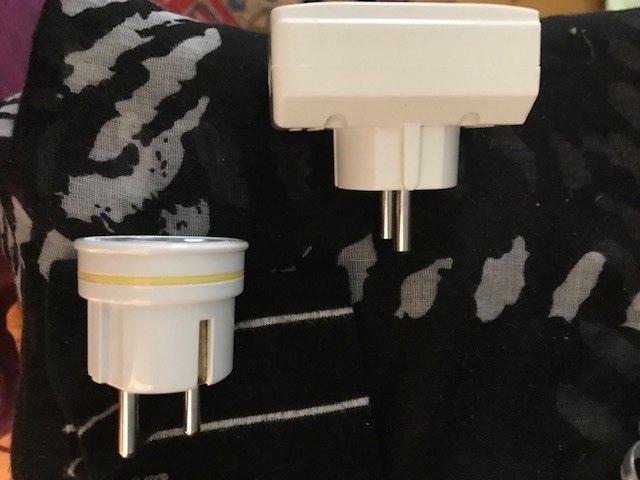
Customs and Cultural Protocol
Downtown Yerevan feels like downtown in liberal, international, big cities from Auckland to Johannesburg to Moscow to Los Angeles. Many women will choose to show their legs and arms in hot weather although men wearing shorts mark you out as a tourist. There are occasionally veiled woman in the city, largely due to the influx of forcibly displaced people from Syria and a steady flow of tourists from neighboring Iran. With plastic surgery as one of the two industries (the other is technology) the Armenian government has chosen to subsidize, expect to see quite a few Kardashian lookalikes on the street. Though not required, it is traditionally the custom for women to place a scarf over their head when visiting the inside of a church.
Without any of the oil wealth, Armenia instead is rich in clean water from the mountains. Throughout the city of Yerevan and along the main roads through the provinces, public fountains are constantly running. People stop and drink freely and fill their water jugs. Food in the local restaurants is generally fresh and locally based, with many vegetarian, vegan and halal options. Our visit will coincide with grape and fig season!
Things to do in the city and beyond
Though we have packed in so much in our five days, so much of Yerevan and Armenia remains for your exploration. Yerevan is a late night, safe, and familyoriented city. You will see local kids, parents, and grandparents out late for a stroll or a meal even on school nights. Here are some additional places you might want to see.
IN YEREVAN
The Blue Mosque Located along downtown Yerevan’s main artery Mashtots Street, this is a beautiful, peaceful place to take in and reflect on the multicultural history of this region. They have a gift shop of crafts from Iran.
Republic Square and its Museums: This central square ringed by a series of grand buildings including the History Museum and national Gallery and is filled with fountains, both for drinking and for a music and light show each evening.
The Matenadaran: This research library and museum houses a vast collection of illuminated manuscripts in a host of primarily Eurasian languages speak to our ancient interconnection. A virtual visit is possible here. They are using ancient texts to make various medicinal oils.

Martiros Saryan Museum: The rich colors and east-west fusion in the gorgeous artwork of Martiros Saryan (1880-1972) capture Armenian history, culture, landscape and identity during the span of his life in a building that was also his studio and home after his move to Yerevan.
The Cafesjian Center for the Arts Museum and Sculpture Garden: The wealthy disaporan and art collector, Gerard Cafesjian, repurposed a Soviet-era war monument into a spectacular center of contemporary art. The optional sunrise walk on Monday morning will bring you through the steps and sculpture garden. Returning to the interior, to the gift shop and at night, are all worth doing. A concert space is located at the top of the building and we will keep you posted on any concerts. At the base of the steps, a group folk dance is due to take place on Friday, Sept. 29.
ABOVE: Fountain at the Government of the Republic of Armenia at night, located on Republic Square in Yerevan.
Opera Theatre and neighborhood: The National Opera and Ballet theatre lies opposite to the Cafesjian Center and following traditions of Soviet classical training. While we are there, Verdi’s “LaTraviata” will be performed on Sept. 23 and Puccini’s “Turandot” on Sept. 25. Cafes and restaurants surround the Opera plaza. Kids ride bikes there and it is also the site of public protests.
Small Theatre: An innovative theatre company with performances with English subtitles.
There are two children’s puppet theaters: The Yerevan State Puppet Theatre located down the street from the Children’s Library and the other near the Matenadaran.
This site lists all the various performance events around town
TUMO Center for Creative Technology: Through a massive diasporan donation, every child between the ages of 12 and 18 has access to state-of-the-art tech education. Since establishing this first TUMO center in Yerevan, there are now several massive centers in other cities and small TUMO “boxes” in some villages. The TUMO brand is now also in many wealthy countries but to date only one has opened in low- to middle-income countries (Albania). If you are interested in seeing this, you can arrange a tour on Friday afternoon.
Komitas Museum: The beautiful and haunting music and life of Vartabed Komitas is preserved here. From Western Armenia, he preserved Armenian folk music which has now entered the classical an folk music canons. Along with over 200 other leading intellectuals Komitas was arrested at the start of the genocide on April 24, 1915. Though he survived torture and incarceration he spent the remainder of his life in a state of madness.
The steep Hrazdan Gorge and river of the same name cut through the edge of Central Yerevan. The park (a good place for running and walking) can be accessed by a 1960’s Soviet-era tunnel accessed from Saryan Steet or from the Kievian Bridge.
Tours of several Brandy|Cognac factories are available in downtown Yerevan, the Ararat company being perhaps the oldest.
SHOPPING
Vernissage: This large open air market open Saturday and Sunday is a wonderful place for a variety of local crafts, gifts, and bric-a-brac to bring home. A few shops are open weekdays.
Ceramics store at Villa Delenda: one of the sister Villas (we are staying at Villa Ayghedzor) of Family Care Foundation’s Ceramics School initiative, downtown Villa Delenda has a more extensive collection of ceramics for purchase. The city of Gyumri, a two-and-a-half-hour-train ride away has the most extensive collection, including a gorgeous museum. More on that below.
There are craft markets in so many of the places we will be visiting and we have made time in the schedule for this shopping when there. Many streets in downtown Yerevan Abovyan, Tumanyan Parpetsi, Sayat Nova, Saryan and more will be home to Italian and other fashion designers, occasionally with a local spin. There are also many stores which offer local crafts.
OUTSIDE OF YEREVAN
Though they constitute a small minority of the population, the Yazidi community has built their largest temple within the safety of Armenia. The Yazidi Temple is a very easy day trip (by taxi) outside of Yerevan and can be combined easily with Etchmiadzin, the Armenian equivalent of the Vatican, for this branch of the Armenian Apostolic Church.
Etchmiadzin Cathedral and ground and Monastery were under renovation in July.
Dilijian, a city into the mountains from Yerevan, is known as “little Switzerland.” With its forested mountain climate, it is a beautiful place to hike and swim and can be reached by taxi or bus.
Gyumri, Armenia’s second largest city and creative hub, can be reached by train. Travel there for a fascinating day or overnight trip, especially with its ceramics school and a history of recovering from a devastating earthquake in 1988.
GETTING AROUND YEREVAN
TAXIS
Yerevan is a great city for walking. There are taxis close on hand and very affordable buses, minibuses and a metro line. You can cross the entire city for about 600 Armenian Drams when it is not rushhour and flag a taxi practically anywhere on the street. On average, the fare should be around 100 Drams per kilometer. Avoid taxis without meters as they are likely to overcharge you. You can also book taxis online through companies like Ulai and Yandex Taxi, but staff at the hotel should be able to advise on the best apps to use. You can book with the app and then pay by cash.
BUSES
Buses and minibuses run from 6:00-23:00. Regardless of the distance, the fare is 100 Drams within the city boundaries. The stops are quite close to one another and someone should be able to help. English is widely spoken in Yerevan.
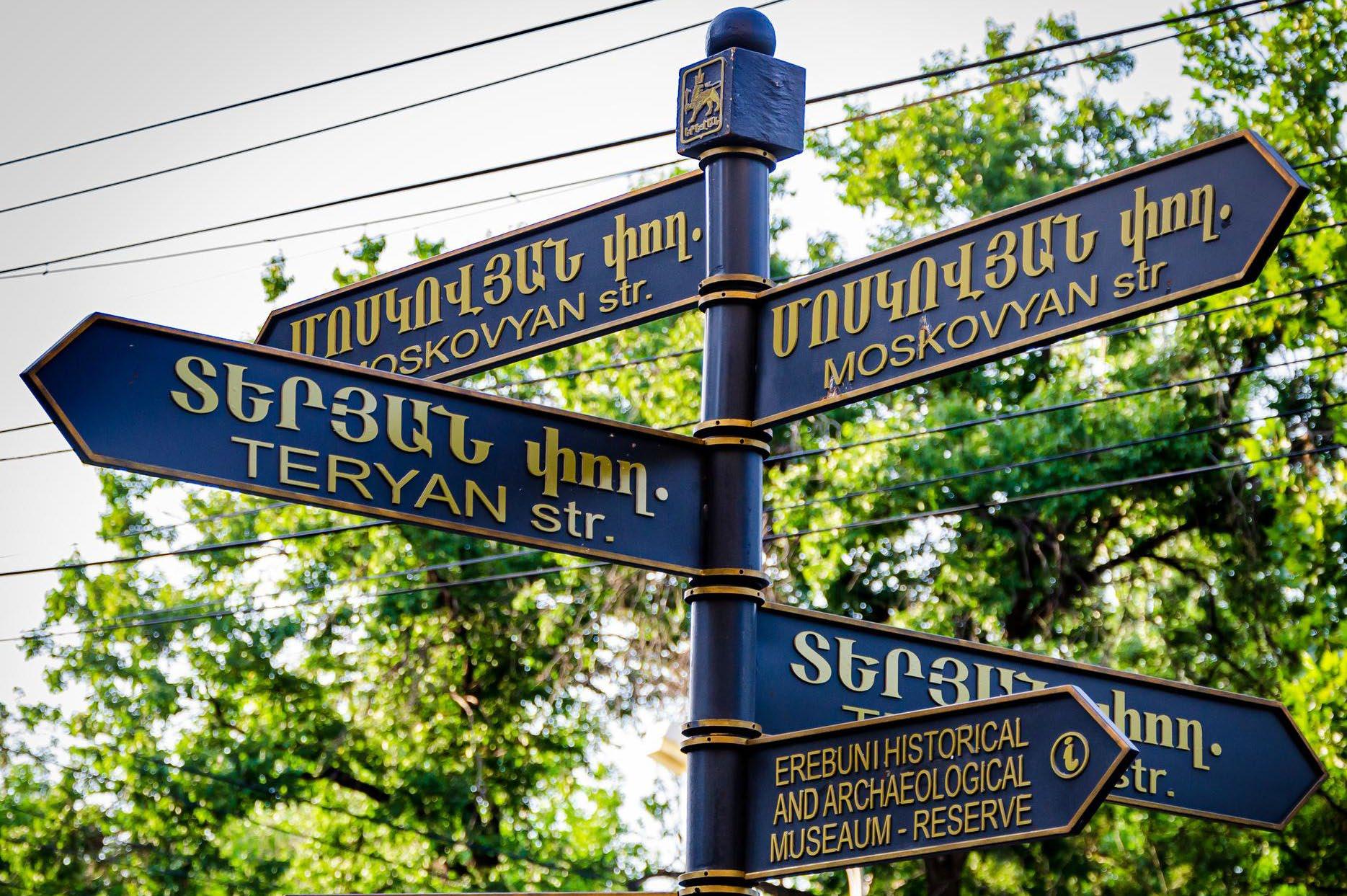
SUBWAY
This service runs from 7:00-23:00. Yerevan metro system has one line stretching from the north to the railroad station in the southern part of the city. There are ten stations in total and you need to buy the 100 Dram token before entering. Tokens are sold in the station and there are also cards where you pay for a predetermined number of trips.
Pre-reading, music, and films list
Light reading about the history of the Silk Road: https://education.nationalgeographic.org/resource/silk-road/
A touching essay by beloved Armenian American playwright and novelist, William Saroyan in 1933 about the loss of Assyrians during the 1915 genocide. Please don’t be thrown off by his use of the word “man” for “human;” his use of the word “race” as inclusive instead of capturing the very real racism upon which the U.S. was built or his use of the word “pansy” to refer to how homophobic his times were. “Seventy Thousand Assyrians”.
A quick history of the life of composer, Komitas, accompanied by oud and voice:https://www.youtube.com/watch?v=FrZe9TZhJkM
And a rendition of Holy from Komitas’s liturgy by Jazz pianist, Tigran Hamasyan: https://www.youtube.com/watch?v=Wo2qZb6I9Hg
The U.S.-based acapella trio, Zulal, on the pagan roots of Armenian folk music. https://www.youtube.com/watch?v=9u5zjyBv6-Y
Atom Egoyan’s film, “Ararat,” expresses the complex responses to the intergenerational trauma of genocide.
Sergei Parajanov’s film, “The Color of Pomegranates,” also known as “Sayat Nova” is named after the troubadour whose story is told here and expresses some of the complex mysticism of Armenian identity.
The animated film, “Aurora’s Sunrise,” is based on the memoir of Aurora Madriganian. “Ravished Armenia” was the book written in 1918 by Arshaluys (Aurora) Mardiganian about her experiences in the Armenian genocide.
The Armenian Language
The Armenian language is one of the earliest branches off the Indo-European root far before the arrival of Christianity. You can find cognates with Romance languages as well as Pashto and Hindi and more. There are at least two dialects: Eastern, spoken in today’s Armenia, Artsakh and Iran and Western, an endangered language that was spoken in the lands that are now Eastern Turkey and among people from
the diaspora who were forcibly displaced. A beautiful thing to note is that the word for person does not default to male and that we do not specify gender with our pronouns. All people are “na” in the first person singular and “nrank” in the plural in Eastern Armenian and “inke” and “anonk” in Western. This speaks to ancestral equality.
Some phrases you might like to use:
Hello Barev
How are you?
“Vonts es?” (Familiar) Vonts ek (Formal) Or “Eench bes es/ek)
I’m fine. Lav em (Fine I am)
Thank you (very much) “merci (shad)” the traditional is “shnorhagalutyun”
Good bye tsedesiotiun
Good luck hadjorootiun (used as a goodbye or go well)
Please Khntroom em
Excuse me Neretsek
Whatever/not to worry Votch eench
Yes Ayo
No “Votch” or “che”
Dear djan (common to use after friends’ name e.g. Durkhanai djan)
Welcome Bari kaloost (bari= good)
Safe travels Bari djanapar
Bon appetite Bari Ahorjag
How wonderful! Eench lav ban
Very delicious!
Shad hamov eh
How sweet! Eench anoush (as in touching and kindness)
Beautiful Keghetsig (eh = it is)
Peaceful Hankist
Fated
Jagad a kir (written on the forehead)
How much? (cost) Eench arje?
Where is? Vor tegh e?
Where are you from? Vor teghitz es?
Do you speak English?
Angleren khosoom es?
I don't understand Chem hasganar
Coffee soorge
Water Joor
Bread hats
Candle mohm
Sun arev
Congratulations Shnhavor
Love Sirov (literally with heart)
These idioms are easier reversed
Achkt luys
Tsavit danim
There’s light in your eyes (the sparkle of something good)
Give me your pain
Participants’ Biographies
Atlantic Fellows
Fellows Leading the Workshop
DURKHANAI AYUBI
Atlantic Fellow for Social Equity Writer and restaurateur, Australia
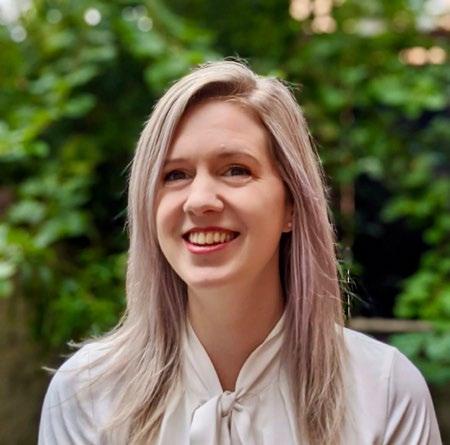
Durkhanai is working to recode what power could look like, based on a reconstructed sense of identity and communicating this through speaking and writing. She makes and shares traditional Afghan food to shift boundaries.
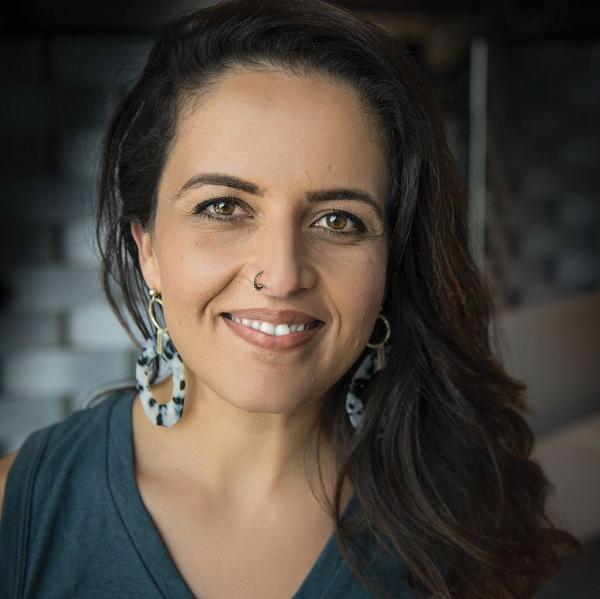
DANA WALRATH
Atlantic Fellow for Equity in Brain Health Writer, artist and anthropologist, United States

Dana practices a blend of writing, comics, art and anthropology and believes in the power of the arts for social change, including offering them as ways to heal from and end global challenges of dementia, racism and genocide.
Atlantic Fellows for Equity in Brain Health
LAURA BOOI
Senior research fellow, Centre for Dementia Research, U.K.
Laura promotes inclusive policies to support and improve the quality of life from early adulthood to older age.
ROWENA RICHIE
Dance theater artist and movement educator, United States
Rowena promotes positive aging through movement-based creative engagement with elders in various settings.
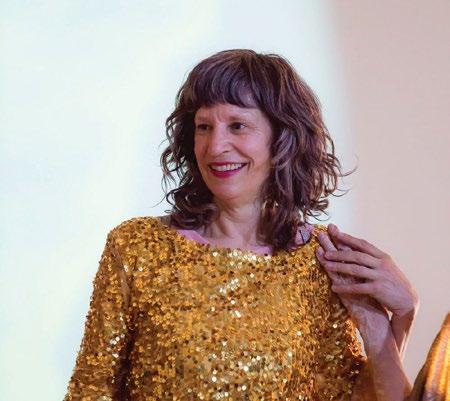
Atlantic Fellows for Health Equity in South Africa
IVANA MERCKEL
Community coordinator, South Africa
Ivana promotes the need for accessible, comprehensive and holistic health education with community participation.
THANIA GOPAL
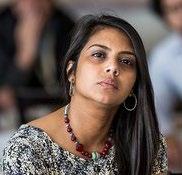
Communications officer, Faculty of Health, University of Cape Town, South Africa
Thania explores the role of the media in influencing and developing more equitable and socially just health systems.
LINDILE NGWENYA
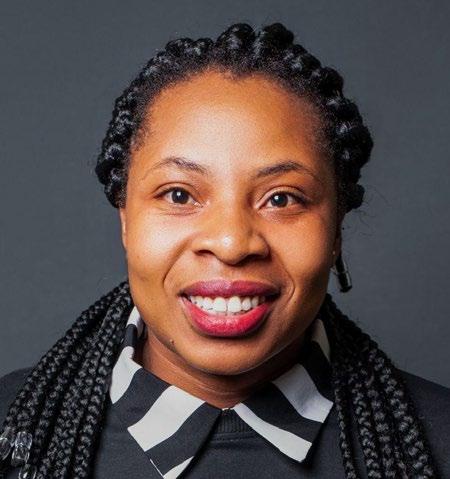
Master’s student, University of the Witswatersrand, South Africa
Lindile supports vulnerable individuals through community development and advocacy. She is a social worker aiming to complete her master’s in migration and displacement.
Atlantic Fellows for Health Equity in Southeast Asia
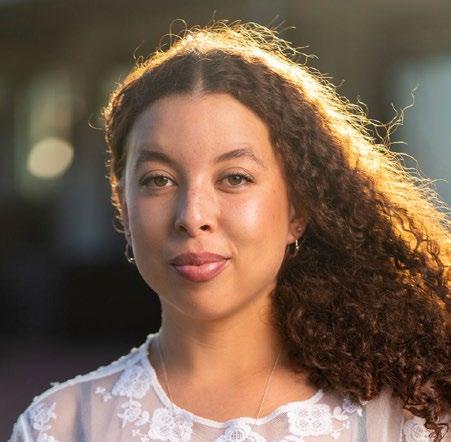
CARMENEZA DOS SANTOS MONTEIRO
Strategic policy adviser, Ministry of Social Solidarity and Inclusion, Timor-Leste

Carmeneza is working toward a just and equal society through fair, inclusive public policy formulation and implementation.
COLLINS SANTHANASAMY
Founder, The M Exchange; a specialist in public health in disasters, Malaysia
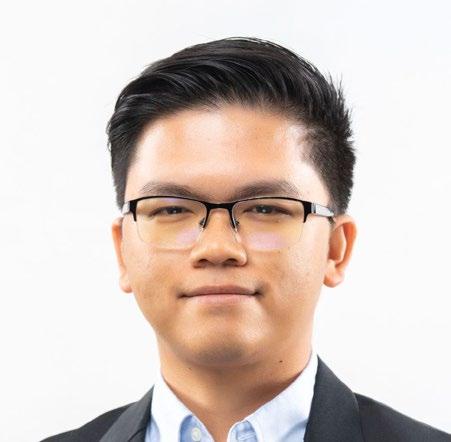
Collins is a medical doctor and building community resilience through tailored disaster risk reduction programs focused on health education and economic empowerment
Atlantic Fellows for Health Equity US+ Global
BRENDA HUGHES
Regional community health coordinator, South Carolina
Department of Health and Environmental Control, U.S.
Brenda works to develop community coalitions, building sustainable communities and addressing root causes of health inequities.

GILBERTO LOPEZ
Assistant professor, University of Arizona, United States
Gilberto is researching and developing interventions to reduce health inequities.
Atlantic Fellows for Racial Equity
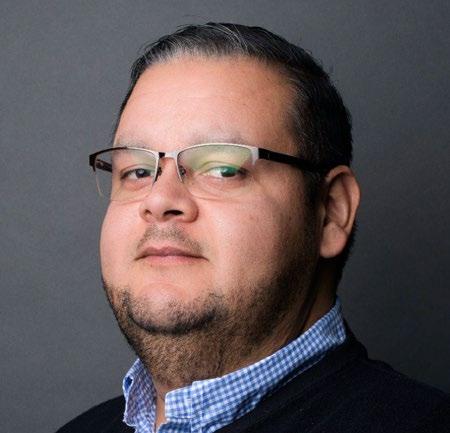
NASSER ELEDROOS
Policy counsel, Color of Change, New York, United States
Nasser is exploring racially equitable approaches to the design, implementation and accountability of algorithms and information systems in U.S. laws.
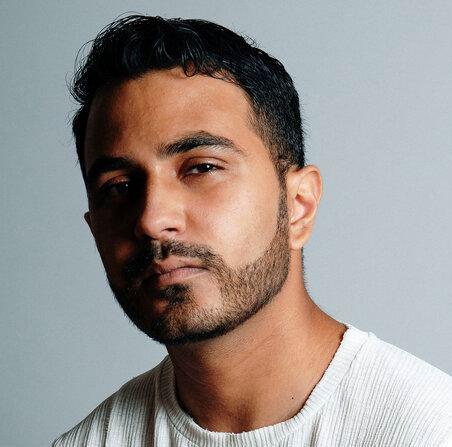
SYDELLE WILLOW SMITH
Co-founder, Sunshine Cinema, South Africa
Co-leading Sunshine Cinema as a documentarian and media advocacy specialist working across Africa.
Atlantic Fellows for Social Equity
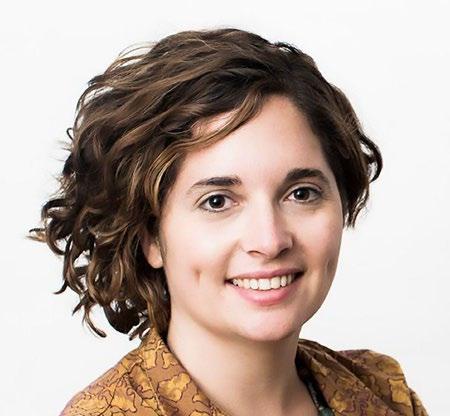
INDU BALACHANDRAN

Director of strategic support, Aboriginal Housing Office, Australia
Reimagining lawful relationality with First Australians through cultural and economic collaboration with migrant communities.

KATRINA SMIT
Director of People and Partnerships, Department of Internal Affairs, New Zealand
Centering joy, abundance and whanaungatanga, being relationally connected, as the foundation for Mana Motuhake, Maori sovereignty and agency.
Atlantic Fellows for Social and Economic Equity
RUBY HEMBROM
Founder and director, Adivaani, India
Ruby amplifies the voices of the Adivasi (Indigenous people of India), sharing their experiences through her nonprofit organization, Adivaani.
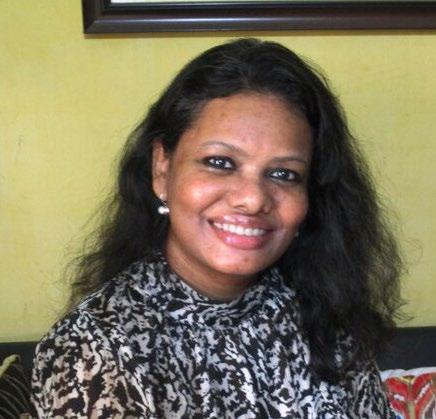
MICHAELA RAFFERTY
Youth engagement & campaigns organizer, Just for Kids Law, U.K.
Michaela engages with young people who are excluded from mainstream education to enable them to become social action leaders transforming the use of school exclusions and advocating for a more inclusive education system.
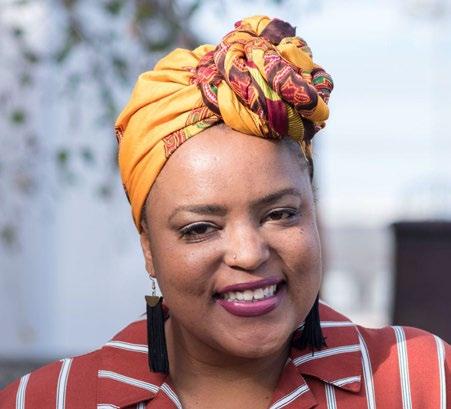
Rhodes Scholar
SUMMIA TORA
Founder of Dosti Network, an organization for Afghans
After the fall of the Afghan government, the Dosti Network launched a global effort to connect Afghans fleeing persecution with resources to resettle in a safe country and for those staying in Afghanistan to access needed resources.
Program Staff
SELAM BEDADA
Associate program director of Atlantic Fellows for Health Equity US+Global
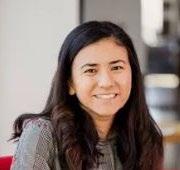
Selam manages the design and implementation of the fellowship program. She has over ten years’ experience in public health research and health systems strengthening.
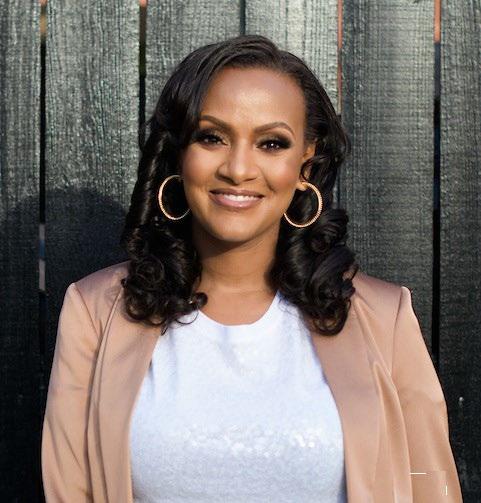
Atlantic Institute
TANYA CHARLES
Senior program and impact lead, and an Atlantic Fellow for Social and Economic Equity
Tanya is project lead for the Global Atlantic Fellows Annual Convening, working with the Global Fellows Advisory Board and the management of the Senior Fellows Community of Practice, as well as co-designing other convenings.
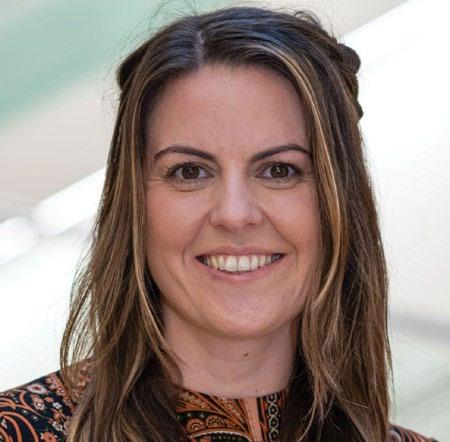 David MALLINSON Team coordinator (convenings)
David MALLINSON Team coordinator (convenings)
David provides operational support to the Atlantic Institute team to ensure the smooth running of activities. He also provides support for convenings and programs in support of Fellows and program staff.
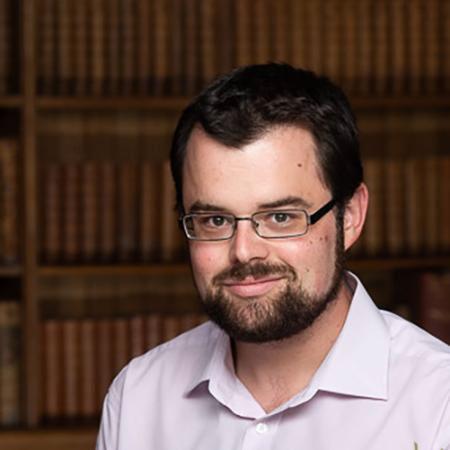 EVIE O’BRIEN Atlantic Institute Executive Director, and an Atlantic Fellow for Social Equity
EVIE O’BRIEN Atlantic Institute Executive Director, and an Atlantic Fellow for Social Equity
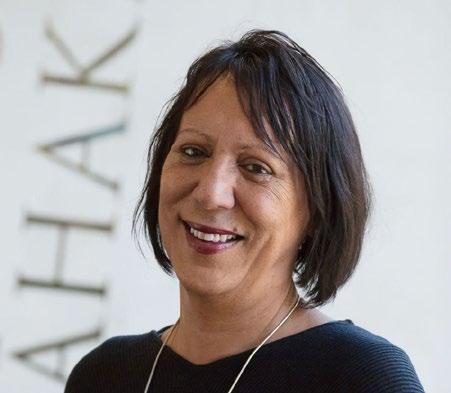
Evie provides overarching strategic and operational leadership to the Atlantic Institute and promotes the Institute’s values, vision and mission. She works with Fellows, programs and host organizations to create a flourishing community.
How will your data be managed?
All personal information provided will be stored and processed by the Atlantic Institute in line with our Privacy Policy and the GDPR principles. When you submitted your application to participate in this event you agreed that you have read and understood the Atlantic Institute’s Privacy Policy on how we collect and use your information to administrate, research, communicate, build and support the global Atlantic Fellows Community.
We should communicate with you if there are any recordings taking place on the event so you can make an informed decision about whether and how you wish to participate.
If you have any questions, comments or concerns about how your data will be managed, please contact Daniel Salazar, Data Insight Lead, daniel.salazarmurillo@atlanticfellows.org.
About the Atlantic Institute
The Atlantic Institute provides Atlantic Fellows and staff with the networks, architecture and resources to connect, learn and act to address the underlying systemic causes of inequity – locally and globally.
It amplifies the influence and impact of the global Atlantic Community of changemaking Fellows and programs through providing resources and opportunities to connect, learn and act together. The Institute promotes collaboration and shared approaches, connects the Atlantic Fellows program community to a broader network of equity-oriented initiatives, and raises global awareness of the work of Fellows and their programs.





 Above: The artwork by Dana Walrath conveys Armenia’s historical context.
Above: The artwork by Dana Walrath conveys Armenia’s historical context.
 ABOVE: View over the city of Yerevan, Armenia, with Mount Ararat in the background.
ABOVE: View over the city of Yerevan, Armenia, with Mount Ararat in the background.























 David MALLINSON Team coordinator (convenings)
David MALLINSON Team coordinator (convenings)
 EVIE O’BRIEN Atlantic Institute Executive Director, and an Atlantic Fellow for Social Equity
EVIE O’BRIEN Atlantic Institute Executive Director, and an Atlantic Fellow for Social Equity
